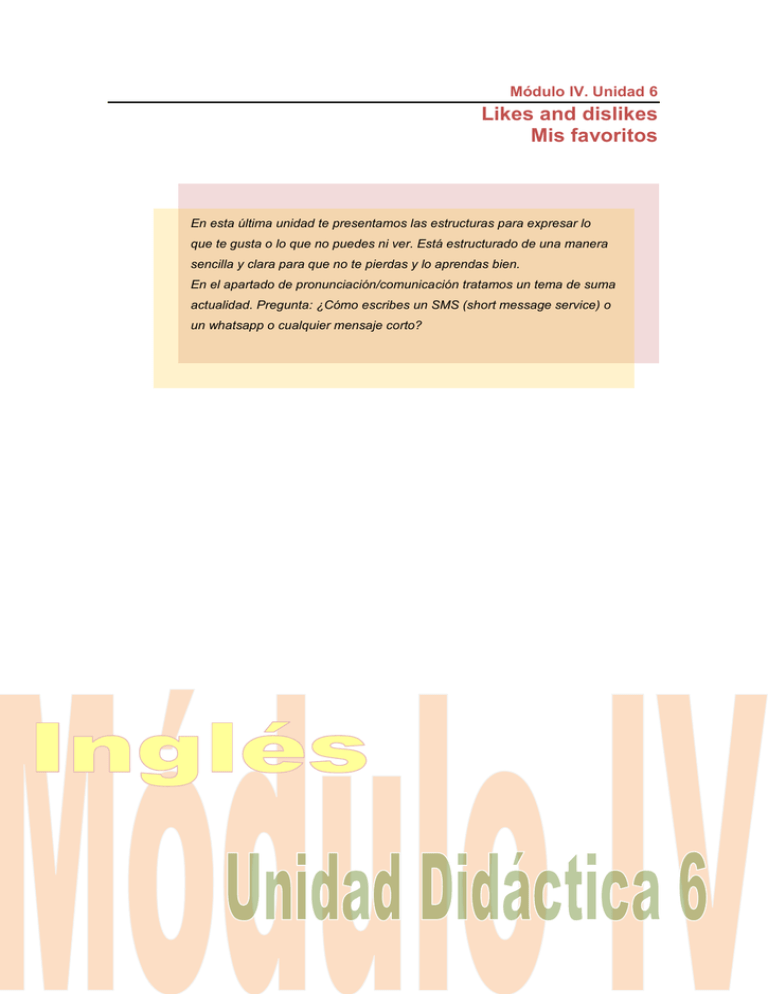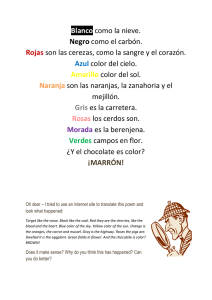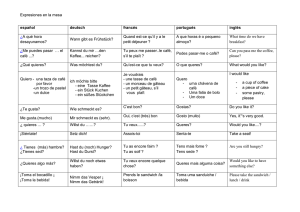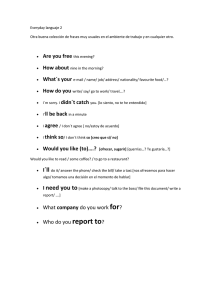Unidad 6
Anuncio

Módulo IV. Unidad 6 Likes and dislikes Mis favoritos En esta última unidad te presentamos las estructuras para expresar lo que te gusta o lo que no puedes ni ver. Está estructurado de una manera sencilla y clara para que no te pierdas y lo aprendas bien. En el apartado de pronunciación/comunicación tratamos un tema de suma actualidad. Pregunta: ¿Cómo escribes un SMS (short message service) o un whatsapp o cualquier mensaje corto? Índice 1. VERBO LIKE (GUSTAR) .......................................................................................................... 3 1.1. Formación .......................................................................................................................... 3 1.2. Uso ..................................................................................................................................... 4 2. LIKE / LOVE / HATE ................................................................................................................. 6 2.1. Formación .......................................................................................................................... 7 3. COMPARACIÓN ENTRE LIKE / WOULD LIKE ...................................................................... 9 3.1. Formación de WOULD LIKE .............................................................................................. 9 3.2. Diferencias entre like y would like .................................................................................... 11 4. MIS FAVORITOS .................................................................................................................... 14 5. PRONUNCIACIÓN / COMUNICACIÓN .................................................................................. 16 5.1. Mensajes cortos de texto ................................................................................................. 16 EJERCICIOS DE AUTOEVALUACIÓN ..................................................................................... 17 SITIOS WEB DE REFERENCIA ................................................................................................. 17 2|Página 1. Verbo Like (gustar) 1.1. Formación Para expresar gustos y preferencias se usa el verbo like (gustar): Estas estructuras que vamos a aprender bien podrían responder a las preguntas: What do you think about…? ¿Qué te parece…? What is your opinion about…? ¿Qué opinas de…? LIKE (gustar) I like (me gusta) You like He/She/It likes We like You like They like Para poner este verbo en forma negativa (“no me gusta”), ponemos delante los verbos auxiliares don’t / doesn’t / didn’t . - I don’t like Bob Marley. - She doesn’t like spaghetti. - We didn’t like school when we were young. Para hacerlo interrogativo (¿“te gusta”?), se ponen delante los verbos auxiliares do /does /did y se mantiene el orden del sujeto y del verbo. - Do you like Bob Marley? - Does she like spaghetti? - Did they like basketball? Observa este recuadro y lo entenderás mejor: 3|Página Affirmative Negative Interrogative ME GUSTA NO ME GUSTA ¿TE GUSTA? I like oranges I don’t like oranges Do I like oranges? You like oranges You don’t like oranges Do you like oranges? He/She/It likes oranges He/She/It doesn’t like oranges Does he/she/it likes oranges? We like oranges We don’t like oranges Do we like oranges? You like oranges You don’t like oranges Do you like oranges? They like oranges They don’t like oranges Do they like oranges? Para poner este verbo en tiempo pasado, al tratarse de un VERBO REGULAR, simplemente se añade -ed eliminando previamente la –e final muda del verbo y se traduce por “gustaba / gustó”: LIKE en pasado LIKE en pasado interrogativo I liked (Me gustaba/gustó) Did I like? (¿Me gustaba/gustó?) You liked Did you like? He/She/It liked Did He/She/It like? We liked Did we like? You liked Did you like? They liked Did they like? 1.2. Uso El verbo LIKE puede ir seguido de un complemento directo (nombre o pronombre) o bien de un verbo en -ing. LIKE + COMPLEMENTO DIRECTO like + NOMBRE I like Bob Marley like + PRONOMBRE = I like him LIKE + VERBO –ING like + VERBO –ing I like dancing. a) LIKE + COMPLEMENTO DIRECTO: El complemento directo puede estar formado indistintamente por un nombre (o sustantivo) o por un pronombre que lo reemplaza. - I like bananas 4|Página - He doesn’t like dogs - Does she like football? Actividad 1. Can you translate these sentences? Match the columns and you will have the answer. A él le gusta el reloj caro I like this dress A ella no le gusta este sombrero He likes the expensive watch ¿A él le gusta su pulsera? I don’t like those shoes Me gusta este vestido Does he like her bracelet? ¿Te gusta mi gorra nueva? Do you like my new cap? No me gustan esos zapatos She doesn’t like this hat b) LIKE + VERBO EN –ing (V–ing): Si el objeto directo es un verbo que denota una actividad este verbo va en la forma INFINITIVO + -ing. ORTOGRAFÍA /SPELLING DE LA FORMA VERBAL -ING: -Normalmente añadimos –ing: Ej.: go going. -Si acaba en -e, desaparece la -e y añadimos –ing: Ej.: drive driving. -Si acaba en sílaba tónica y en consonante+vocal+consonante, duplicamos la última consonante y añadimos -ing. Ej.: shop shopping. swim swimming Ejemplos: • I like going swimming. • She likes buying birthday cakes. • We like going to the beach. • Do you like dancing? • I hate cooking. 5|Página Actividad 2. Write the -ing form of the following verbs. 1. Dance + -ing dancing 2. Sit 3. Listen 4. Play 5. Run 6. Speak 7. Write 8. Stop 9. Eat 10. Ride Actividad 3. Can you translate these sentences? Match the columns and you will have the answer. 1. Me gusta ir al cine I like going to the cinema 2. A ella le gusta comprar regalos Do you like going to the sales? 3. A ti no te gusta probarte ropa He doesn’t like choosing 4. A él no le gusta elegir. Does he like receiving gifts? 5. ¿Le gusta recibir regalos? She likes buying presents 6. You don’t like trying on clothes ¿Te gusta ir de rebajas? 2. Like / Love / Hate Otros verbos que expresan preferencias y se construyen igual que like son love (amar personas / encantar cosas) y hate (odiar/ detestar). 6|Página 2.1. Formación LIKE LOVE HATE I like I love I hate You like You love You hate He/She/ It likes He/She/It loves He/She/It hates We like We love We hate You like You love You hate They like They love They hate APRENDE Las siguientes preguntas y respuestas nos sirven para hablar de lo que nos gusta o no nos gusta: Do you like classical music? I love it. (Me encanta). I like it very much. (Me gusta mucho). I don’t like it very much. (No me gusta mucho). I hate it. (Lo odio). Who is your favourite singer? My favourite singer is Bob Marley (¿Quién es tu cantante preferido?). What is your favourite food? My favourite food is spaghetti. (¿Cuál es tu comida favorita?). Para poner estos verbos en forma negativa, ponemos delante los verbos auxiliares don’t / doesn’t / didn’t. I don’t hate vegetables (No detesto las verduras). She doesn’t love classical music (No le encanta la música clásica). Para hacerlo interrogativo, se ponen delante los verbos auxiliares do /does/ did y se mantiene el orden del sujeto y del verbo. Do you love Bob Marley? (¿Te encanta Bob Marley?). Did she hate spaghetti? (¿Detestaba los espaguetis?). Para poner estos verbos en tiempo pasado, al tratarse de VERBOS REGULARES, simplemente se añade -ed, eliminando previamente la –e final muda del verbo: 7|Página LOVE en pasado HATE en pasado I loved I hated You loved You hated He/She/It loved He/She/It hated We loved We hated You loved You hated They loved They hated Actividad 4. Match the sentences and the pictures. 1. She loves shopping. [ ___ ] 2. She likes reading very much. [ ___ ] 3. They love dancing. [ ___ ] 4. They love parties. [ ___ ] 5. She loves ice-cream. [ ___ ] 6. She likes chatting on the phone. [ ___ ] a b c d e f Fuente: http://www.edu.xunta.es/web/ 8|Página Actividad 5. Put the words in the correct order. 1. like / to / the / my / cinema / going / parents 2. brothers / going / your / hate / ? / school / do / to 3. going / car / she / by / hates 4. to / hate / songs / we / those / listening 5. ? / girl / watching / love / that / TV / does 1. 2. 3. 4. 5. 3. Comparación entre Like / Would Like Presentamos ahora otra construcción diferente pero a menudo confundida con el verbo LIKE ya que se forma a partir de éste: would like Es la forma condicional de LIKE y se suele traducir como “me gustaría” o “querría”. Ejemplos: - I would like to swim in the sea Me gustaría bañarme en el mar. - They would like to play a game Les gustaría jugar un partido. Siempre va seguido de la construcción TO + VERBO EN INFINITIVO Ejemplos: - I would like to have a soda Me gustaría tomarme un refresco. - She would like to watch that concert Le gustaría ver ese concierto. 3.1. Formación de WOULD LIKE Siempre poniendo el verbo auxiliar WOULD (normalmente utilizado para construcciones condicionales) delante del verbo LIKE: Para poner estos verbos en forma negativa (“no me gustaría”), añadimos NOT al verbo auxiliar wouldn’t / would not (se pueden emplear indistintamente). - I wouldn’t like to study tonight No me gustaría estudiar esta noche. - She would not like to eat meat Le gustaría no comer carne. 9|Página Para hacer esta construcción interrogativa, se ponen delante el verbo auxiliar would y se mantiene el orden del sujeto y del verbo. - Would you like to have a drink? ¿Te gustaría tomar algo? APRENDE La forma interrogativa WOULD YOU LIKE TO… se usa para ofrecer o invitar y adquiere el significado de “Te apetece…?/Te apetecería…?”: Would you like to dance? Would you like to come to my party? Affirmative Negative Interrogative ME GUSTARÍA NO ME GUSTARÍA ¿TE GUSTARÍA? I would like I wouldn’t like Would I like? You would like You wouldn’t like Would you like? He/She/ It would like He/She/ It wouldn’t like Would he/she/it like? We would like We wouldn’t like Would we like? You would like You wouldn’t like Would you like? They would like They wouldn’t like Would they like? would like Affirmative FORMA CORTA I’d like You’d like He’d/She’d like We’d like You’d like They’d like 10 | P á g i n a 3.2. Diferencias entre like y would like LIKE Forma like + Verbo en -ing Significado gustar (en sentido general) Respuesta corta Do you like reading? Yes, I do / No, I don't. ¿Te gusta leer? Sí / No. WOULD LIKE Forma would like + to + Verbo en infinitivo Significado gustaría, querría, apetece (algo concreto) Respuesta corta Would you like to have a drink? Yes, I would / No, I wouldn't. ¿Te apetece / te gustaría tomar algo? Sí/No. Actividad 6. Complete with would like or like. 1. He …………………. (negative) watching TV. 2. …………………. you …………………. to sleep in my house next Saturday? 3. …………………. you …………… watching horror films? I hate them. 4. They …………………. to buy a house with a garden. 5. My sister …………………. listening to pop music. 6. …………………. she …………………. dancing salsa? 7. …………………. you …………………. to go dancing on Saturday? 8. I …………………. to go out with you tonight. 11 | P á g i n a WRITING Actividad 7. Write about the people in the pictures: say what they like doing and what they don’t like doing. You can use these expressions: phone / buy clothes / sleep / write / do the housework 1. 2. 3. 4. 5. Fuente: http://www.edu.xunta.es/web/ 12 | P á g i n a WRITING Actividad 8. You have won a trip. Choose one of these destinations and write about your wishes. Use I would like to… Acabas de ganar en un concurso un viaje. Escoge uno de estos destinos y expresa tus deseos sobre el viaje. Emplea I would like to... Dream holiday You've won a holiday. Congratulations! You can go to one of these places: 2 weeks in Africa 1 week of cruise + 1 week of Caribbean Island beach holiday 2 weeks in Austria (mountains and lakes – in winter or in summer) Fuente: http://www.edu.xunta.es/web/ Choose one destination and complete the chart (Elige un destino y completa cada cuadro) 2.3.1 1. Where would you like to go? Africa - Austria - on a cruise Africa - Austria - on a cruise 2. Where would you like to stay? hotel - bed and breakfast - campsite other 3. What would you like to eat? English food - local food - hamburgers • 4. What would you like to do there? sleep - go sightseeing (hacer turismo) in the morning? - do sports in the afternoon? in the evening? at night? -go on a safari - swim - relax -go to pubs - other 13 | P á g i n a ANSWERS: 1. I would like to go to… 2. I … 3. … 4. 4a. In the morning, I would like to… 4b. In the afternoon, I … 4c. In the evening, I … 4d. At night, I … 4. Mis favoritos Cuando hablamos de favoritos nos referimos a las cosas o personas que más nos gustan o con las que más disfrutamos: "What's your favourite colour?" "Green." Actividad 9. Study the dialogue of Lauren talking to her new friend Sonia and answer the questions. Lauren: What kind of films do you like best? Sonia: Science fiction films. And you? Lauren: Comedy. And who's your favourite actor? Sonia: Tom Cruise. Lauren: I like Robert de Nero most. 1.- What are Sonia’s favourite kind of Films? 2.- What is Sonia’s favourite actor? 3.- Is Tom Cruise Lauren’s favourite actor? Si quieres preguntar por los favoritos, puedes utilizar estas expresiones: What's your favourite sport? 14 | P á g i n a What sport do you like best? What sport do you like most? What kind of sport do you like best? Who's your favourite football player? Para responder, utiliza estas otras: My favourite sport is football. I like football best. I like football most. My favourite football players are Ronaldo and Messi. Si hablamos de preferencias, se utiliza básicamente el verbo PREFER cuya estructura sería: -Prefer + nombre: - I prefer tea. - I prefer orange juice. -Prefer + to + verbo en infinitive: - I prefer to go to the cinema. - I prefer to go to the beach. Para preguntar: Which do you prefer tea or coffee? Which do you prefer drinking science or physics? Which do you prefer to drink juice or mineral water? (Notice: prefer to + present simple) Which do you like better basketball or football? Do you prefer pizza or spaghetti? Would you prefer to eat a cake or a fruit? Would you rather eat a cake or a fruit? Para responder: I prefer baseball. I prefer to drink juice. If I had a choice, I would eat a sandwich. A cup of coffee would be good. 15 | P á g i n a 5. Pronunciación / Comunicación 5.1. Mensajes cortos de texto Hoy en día el teléfono móvil se ha convertido en una herramienta de uso cotidiano a todos los niveles de la sociedad: nos facilita la vida, al poder contactar en cualquier momento con nuestra familia, amigos o compañeros de trabajo. Además de las llamadas, la telefonía móvil nos permite a través de los mensajes de texto, avisar a alguien de un determinado acontecimiento sin necesidad de realizar una llamada. Para ello, debido a la urgencia del momento y para que exista más espacio útil para comunicar lo que queremos, tendemos a abreviar las palabras ¡¡Sin llegar al punto que nos resulten indescifrables a nosotros mismos!! Esto se hace en ta n to e n e s p a ñ o l c o m o e n i n g l é s , por lo que estimamos interesante ofrecerte un resumen de las abreviaturas más habituales que se hacen en inglés. Abreviatura Palabra real NP no problem PLS please UR You are CU see you 2U to you ASAP as soon as possible AML all my love 2NITE tonight THX thanks 16 | P á g i n a Ejercicios de autoevaluación Ejercicio 1. SMS language: try to guess these messages hidden in the acronyms. MSG OMG FYI WAN2 XLNT WKND L8R M8 Ejercicio 2. Correct the mistakes. 1. The children doesn’t like that film. 2. He loves writing letters. 3. Do you like cook? Yes, I do. 4. He dislikes sit on that armchair. 5. Does your father hate driveing at night? [ Ejercicio 1. SOLUCIÓN Message Oh my god ! for your information (mensaje) (¡díos mío!) (para su información) excellent weekend later mate (fin de semana) (luego) (colega) (estupendo) want to (quiero) Ejercicio 2. SOLUCIÓN 1. The children don’t like that film. 2. He loves writing letters. 3. Do you like cooking? Yes, I do. 4. He dislikes sitting on that armchair. 5. Does your father hate driving at night? Sitios web de referencia www.aulafacil.com/CursoIngles www.learnenglish.be/ www.isabelperez.com/ www.shertonenglish.com 17 | P á g i n a



